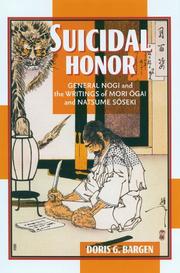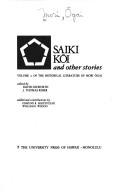| Listing 1 - 5 of 5 |
Sort by
|
Book
ISBN: 0521213193 Year: 1979 Volume: no. 28 Publisher: Cambridge [Eng.] ; New York : Cambridge University Press,
Abstract | Keywords | Export | Availability | Bookmark
 Loading...
Loading...Choose an application
- Reference Manager
- EndNote
- RefWorks (Direct export to RefWorks)
Authors, Japanese --- Biography. --- Mori, Ōgai, --- J5931 --- J5500.70 --- J2284.70 --- Japan: Literature -- modern fiction and prose (1868- ) -- criticism --- Japan: Literature -- history and criticism -- modern, Kindai (1850s- ), bakumatsu, Meiji, Taishō --- Japan: Genealogy and biography -- biographies -- kindai (1850s- ), bakumatsu, meiji, taishō --- Mori, Ōgai, 1862-1922 --- Biography --- Mori, Ōgai, --- Mori, Rintarō, --- Ōgai, Mori, --- Ōgai Gyoshi, --- 森鷗外, --- 森〓外, --- 森鸥外, --- 森林太郎, --- 鷗外漁史,
Book
ISBN: 3839418933 3837618935 1322000077 9783839418932 Year: 2014 Publisher: Bielefeld transcript Verlag
Abstract | Keywords | Export | Availability | Bookmark
 Loading...
Loading...Choose an application
- Reference Manager
- EndNote
- RefWorks (Direct export to RefWorks)
Seit der Öffnung des Landes in der Mitte des 19. Jahrhunderts bewegte sich Japan rasant auf dem Weg zur industrialisierten Weltmacht. Das dort seit den 1890er Jahren durch Mori Ogai aus Europa ›eingeführte‹ romantische Syndrom jedoch verzauberte insbesondere die jungen Intellektuellen und trieb sie zur Suche nach der japanischen kulturellen Identität an. Ziel war es, nach innen die gesamte Bevölkerung zu integrieren und nach außen das Land vom »Westen« unterscheidbar zu machen - und zwar paradoxerweise im Geist der europäischen Romantik. Takemitsu Morikawa geht diesen bemerkenswerten Entwicklungen auf den Grund und zeichnet die Entstehung und die Kanonisierung des vermeintlichen Selbstbildes des modernen Japan nach. »Ein überaus aufschlussreiches und gut strukturiertes Werk [...], das dank intensiver Recherche und Quellenanalyse fundierte Einblicke in die Rezeptionsgeschichte von Ogai [...] bietet. Das vorliegende Buch [kann man] auch Soziologen und Literaturwissenschaftlern empfehlen, die sich mit der Bildung von kollektivem Gedächtnis und dem Prozess der Kanonisierung beschäftigen. Darüberhinaus ist es für Japanologen lesenswert, die sich mit dem kulturellen Umbruch Japans in der Meiji-Zeit und dessen heutiger Interpretation beschäftigen.« Timo Thelen, http://djas.uni-duesseldorf.de, 5 (2014)
Self-perception --- National characteristics, Japanese. --- Romanticism --- Mori, Ōgai, --- Self-concept --- Self image --- Self-understanding --- Perception --- Self-discrepancy theory --- Self-evaluation --- Japanese national characteristics --- Mori, Rintarō, --- Ōgai, Mori, --- Ōgai Gyoshi, --- 森鷗外, --- 森〓外, --- 森鸥外, --- 森林太郎, --- 鷗外漁史, --- Cultural History. --- Culture. --- General Literature Studies. --- Interculturalism. --- Literary Studies. --- Literature. --- National Identity. --- Romanticism. --- Japan; Nationale Identität; Kulturelles Gedächtnis; Romantik; Mori Ogai; Literatur; Kultur; Allgemeine Literaturwissenschaft; Interkulturalität; Kulturgeschichte; Literaturwissenschaft; National Identity; Romanticism; Literature; Culture; General Literature Studies; Interculturalism; Cultural History; Literary Studies
Book
ISBN: 9783447058438 3447058439 Year: 2011 Publisher: Wiesbaden Harrassowitz
Abstract | Keywords | Export | Availability | Bookmark
 Loading...
Loading...Choose an application
- Reference Manager
- EndNote
- RefWorks (Direct export to RefWorks)
Homes. --- Intellectual life. --- Motiv. --- Weihnachten. --- Werk. --- Mori, Ōgai, --- Mori, Ōgai. --- Criticism and interpretation. --- Homes and haunts --- Geschichte. --- Europa. --- Japan --- Japan. --- Tsuwano-chō (Japan) --- Tsuwano. --- J2284.70 --- J5931 --- Japan: Genealogy and biography -- biographies -- kindai (1850s- ), bakumatsu, meiji, taishō --- Japan: Literature -- modern fiction and prose (1868- ) -- criticism --- Mori, Ōgai, --- Mori, Rintarō, --- Ōgai, Mori, --- Ōgai Gyoshi, --- 森鷗外, --- 森〓外, --- 森鸥外, --- 森林太郎, --- 鷗外漁史, --- Tsuwano-chō. --- Tsuwano-chō (Japan) --- Tsuwano-chō, Japan

ISBN: 9780824829988 0824864514 1435665996 9780824864514 9781435665996 0824829980 Year: 2006 Publisher: Honolulu : University of Hawaii Press,
Abstract | Keywords | Export | Availability | Bookmark
 Loading...
Loading...Choose an application
- Reference Manager
- EndNote
- RefWorks (Direct export to RefWorks)
"On September 13, 1912, the day of Emperor Meiji's funeral, General Nogi Maresuke committed ritual suicide by seppuku (disembowelment). It was an act of delayed atonement that paid a debt of honor incurred thirty-five years earlier. The revered military hero's wife joined in his act of junshi ("following one's lord into death"). The violence of their double suicide shocked the nation. What had impelled the general and his wife, on the threshold of a new era, to resort so drastically, so dramatically, to this forbidden, anachronistic practice? The nation was divided. There were those who saw the suicides as a heroic affirmation of the samurai code; others found them a cause for embarrassment, a sign that Japan had not yet crossed the cultural line separating tradition from modernity.While acknowledging the nation's sharply divided reaction to the Nogis' junshi as a useful indicator of the event's seismic impact on Japanese culture, Doris G. Bargen in the first half of her book demonstrates that the deeper significance of Nogi's action must be sought in his personal history, enmeshed as it was in the tumultuous politics of the Meiji period. Suicidal Honor traces Nogi's military career (and personal travail) through the armed struggles of the collapsing shôgunate and through the two wars of imperial conquest during which Nogi played a significant role: the Sino-Japanese War (1894-1895) and the Russo-Japanese War (1904-1905). It also probes beneath the political to explore the religious origins of ritual self-sacrifice in cultures as different as ancient Rome and today's Nigeria. Seen in this context, Nogi's death was homage to the divine emperor. But what was the significance of Nogi's waiting thirty-five years before he offered himself as a human sacrifice to a dead rather than living deity? To answer this question, Bargen delves deeply and with great insight into the story of Nogi's conflicted career as a military hero who longed to be a peaceful man of letters. In the second half of Suicidal Honor Bargen turns to the extraordinary influence of the Nogis' deaths on two of Japan's greatest writers, Mori Ôgai and Natsume Sôseki. Ôgai's historical fiction, written in the immediate aftermath of his friend's junshi, is a profound meditation on the significance of ritual suicide in a time of historical transition. Stories such as "The Sakai Incident" ("Sakai jiken") appear in a new light and with greatly enhanced resonance in Bargen's interpretation. In Sôseki's masterpiece, Kokoro, Sensei, the protagonist, refers to the emperor's death and his general's junshi before taking his own life. Scholars routinely mention these references, but Bargen demonstrates convincingly the uncanny ways in which Sôseki's agonized response to Nogi's suicide structures the entire novel. By exploring the historical and literary legacies of Nogi, Ôgai, and Sôseki from an interdisciplinary perspective, Suicidal Honor illuminates Japan's prolonged and painful transition from the idealized heroic world of samurai culture to the mundane anxieties of modernity. It is a study that will fascinate specialists in the fields of Japanese literature, history, and religion, and anyone seeking a deeper understanding of Japan's warrior culture." -- Publisher's description.
J2284.70 --- J5931 --- J5009 --- J4121 --- J4234 --- Japan: Genealogy and biography -- biographies -- kindai (1850s- ), bakumatsu, meiji, taishō --- Japan: Literature -- modern fiction and prose (1868- ) -- criticism --- Japan: Language -- theory, methodology and philosophy --- Japan: Sociology and anthropology -- leadership and loyalty --- Japan: Sociology and anthropology -- social pathology -- suicide --- Japanese literature --- Suicide in literature. --- Seppuku. --- Hara-kiri --- Harakiri --- Suicide --- History and criticism. --- Natsume, Sōseki, --- Mori, Ōgai, --- Nogi, Maresuke, --- Nogi, Kiten, --- 乃木希典, --- Mori, Rintarō, --- Ōgai, Mori, --- Ōgai Gyoshi, --- 森鷗外, --- 森〓外, --- 森鸥外, --- 森林太郎, --- 鷗外漁史, --- Natsume, Kinnosuke --- Sōseki, Natsume --- Sōseki --- Hsia-mu, Shu-shih --- Xiamu, Shushi --- 夏目, 漱石 --- 夏目, 金之助 --- Criticism and interpretation. --- In literature.

ISBN: 0824804546 Year: 1977 Publisher: Honolulu University press of Hawaii
Abstract | Keywords | Export | Availability | Bookmark
 Loading...
Loading...Choose an application
- Reference Manager
- EndNote
- RefWorks (Direct export to RefWorks)
J5933 --- Japan: Literature -- modern fiction and prose by individual authors (1868- ) --- Mori, Ōgai, 1862-1922 --- -Translations into English --- Japan --- Social life and customs --- -Fiction. --- Mori, Ōgai, --- Mori, Rintarō, --- Ōgai, Mori, --- Ōgai Gyoshi, --- 森鷗外, --- 森〓外, --- 森鸥外, --- 森林太郎, --- 鷗外漁史, --- Translations into English. --- Nihon --- Nippon --- Iapōnia --- Zhāpān --- I︠A︡ponii︠a︡ --- Yapan --- Japon --- Japão --- Japam --- Mư̄ang Yīpun --- Prathēt Yīpun --- Yīpun --- Jih-pen --- Riben --- Government of Japan --- 日本 --- 日本国 --- Nipponkoku --- Nippon-koku --- Nihonkoku --- Nihon-koku --- State of Japan --- Япония --- Japani --- اليابان --- al-Yābān --- يابان --- Yābān --- Japonsko --- Giappone --- Japonia --- Japonya --- Fiction. --- Jepun --- Yapon --- Yapon Ulus --- I︠A︡pon --- Япон --- I︠A︡pon Uls --- Япон Улс
| Listing 1 - 5 of 5 |
Sort by
|

 Search
Search Feedback
Feedback About
About Help
Help News
News